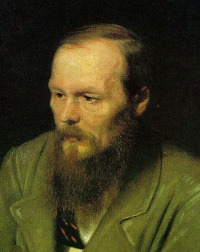Around a couple of months back, I finished the two masterpieces by Fyodor Dostoevsky – Crime and Punishment and The Brothers Karamazov. My first interaction with Mr. Dostoevsky was through the ‘sick and spiteful man’ from the underground. Later, I read a couple of his short stories and I knew that this was an author beyond the defines and limits of literature. A master philosopher, a story teller by instinct and a critic of human condition and social relations by accident – Dostoevsky is an important, unique and essential figure in human history.
Brothers Karamazov. My first interaction with Mr. Dostoevsky was through the ‘sick and spiteful man’ from the underground. Later, I read a couple of his short stories and I knew that this was an author beyond the defines and limits of literature. A master philosopher, a story teller by instinct and a critic of human condition and social relations by accident – Dostoevsky is an important, unique and essential figure in human history.
I had both of Mr. Dostoevsky’s masterpieces on my unread pile for quite sometime. In the meanwhile, I discovered and read The Outsiderby Colin Wilson. Before I could finish and put down this extraordinay book by Wilson, I ws already itching to visit Raskalnikov and Ivan respectively.
I am not going to attempt a review or critique of these two works; in my opinion they deserve to be read and re-read and that’s all. Dostoevsky’s insight into human psyche, particularly into those of the troubled ones, is unprecedented and accurate. Rasalkalnikov’s total failure to live with his crime never makes him doubt the theoretical validity of the ‘idea’ that made him committ that crime. Ivan’s act of returning the ticket causes insanity, but never once does he contemplate religion as an escape route. These are not instances of ‘heroism’ or glorification of atheism. It is sheer intellectual honesty. Dostoevsky knows that a man who has limitless access to logic can never committ himself to an illogical conclusion even if it is a matter of life and death. I doubt if Dostoevsky meant this as a compliment – he meant this more as a psychological and social problem of such men to which he never found an answer, neither has anyone else.
There is more to these two books than can ever be visited in a blog post. With the vitality of Brothers.. and asthetics of Crime.., between these two books, Mr. Dostoevsky has probably travelled the ‘whole nine yards’ of literature.
Devil to Ivan in The Brothers Karamazov


I’ve never read Dostoevsky’s Notes from Underground and need to do so one of these days. I’ve read Crime and Punishment several times – in high school, college, sometime in my 20s, and I think the last time was when I was in bed trying to keep from having a miscarriage in my 30s.
Amazingly, I had never read The Brothers Karamazov until last year. I read and re-read The Grand Inquisitor in several different translations. That’s how I got involved in Hubert Dreyfus’s class on Existentialism and literature. After reading the Grand Inquisitor, I wondered if Dostoevsky was an existentialist and landed on Dreyfus’s Berkeley Webcast class on Existentialism and Literature. The reading was Kierkegaard, Doestoevsky and Nietzsche. Dreyfus used The Brother’s Karamazov to present Dostoevsky’s views so it worked out beautifully for me.
At the end of the class, Dreyfus asked which of the three existentialists we most identified with – hands down for me it is Dostoevsky. I tend to lean toward mysticism (not mysticism in the magical sense – but mysticism in the existential sense) and I think Dostoevsky is likely right that the original Russian Orthodoxy offered a way out of the herd mentality of Roman Catholicism and the sort of Ivanesque secularization that Protestantism ushered in. The very first split in Catholicism was Greek Orthodoxy from the Roman Catholic (in the early 1000s, I think). The problem Greek Orthodoxy has with Roman Catholicism was that Roman Catholicism was trying to rewrite Christianity in terms of Greek rationalism. It was new to them in the middle ages. But the Greeks had lived with Greek Rationalism for centuries and were fully aware of the pitfalls. Protestantism, of course, is a direct result of Roman Catholicism. The Russian Orthodox church had taken a different direction altogether. Of course, if Zosima is any indication, Dostoevsky was aware of the pitfalls within Russian Orthodoxy, too. But he was right – it did offer an alternative to the typical Western mindset – especially since it’s very easy to existentialize Russian orthodoxy and impossible to existentialize Protestantism or Roman Catholicism.
Fought through Crime and Punishment about 7 years ago while waiting for a work visa to arrive. I remember being annoyed with it yet at the same time drawn to it. I should revisit it again, now that I am older and hopefully wiser…..
Pingback: Revisiting the Magic of Dostoevsky (TSS) « Book Crazy
You share interesting things here. I think that your website can go viral easily, but you must give it
initial boost and i know how to do it, just type in google (with quotes) for – “mundillo traffic increase make your website go viral”